Excavation Contractors Grangetown
Find Excavation Company Near Me in Grangetown
Receive up to 3 Excavation Contractor quotes for your project today! Compare profiles, reviews, accreditations, portfolio, etc... and choose the best service.

Diamond Drainage & Groundworks
4.650 reviewsUnit 1 Stephenson Court, Skippers Lane, Middlesbrough, TS6 6UT, GBDiamond Drainage & Groundworks: Your Local Experts for All Your Drainage and Groundwork Needs Diamond Drainage & Groundworks is a trusted local company serving the North East of England. We specialize in providing high-quality drainage and groundwork services for both residential and commercial clients. Our team of experienced professionals is dedicated to delivering exceptional service at competitive prices. Why Choose Diamond Drainage & Groundworks? 24/7 Emergency Callouts: We understand that drainage issues can arise at any time, so we offer a free emergency callout service, available 24 hours a day, 7 days a week. Fast and Efficient Service: We strive to provide prompt service, with most callouts completed within the hour. Competitive Pricing: We offer transparent pricing and are committed to beating any like-for-like quotation. Guaranteed Workmanship: All our work is fully guaranteed, giving you peace of mind. Friendly and Reliable Team: Our team is known for their reliability, friendliness, and tidiness. Local Expertise: As a local company, we understand the unique challenges of the North East and are committed to providing tailored solutions. Our Services We offer a comprehensive range of drainage and groundwork services, including: Drainage Services: Toilet unblocking, sink unblocking, external drain unblocking, drainage installation, high pressure drain jetting, CCTV drain inspection, soakaways, manhole inspection & repair, drain repair, land drain, septic tanks. Groundwork Services: Residential & commercial, ground stabilisation, reinforced concrete works, retaining walls & service yards, Section 278 highway works, block paving and slabbing, parking areas, resin driveways & walkways, demolition, specialist plant hire, all insurance work undertaken.
- Services
- Why Us?
- Gallery
Get Quote
McLaughlin Groundworks Ltd
Middlesbrough, GBWelcome to McLaughlin Groundworks Ltd We are your local groundworks company based in Stockton-on-Tees and offering our services throughout Stockton, Middlesbrough, Redcar, Darlington, Hartlepool and all surrounding areas. We specialize in all aspects of groundworks and civil engineering, and we have over 20 years of experience in providing our comprehensive services. If you require a service not listed here, please do not hesitate to contact us and one of our expert team will be more than happy to discuss your individual requirements. All of our employees are fully qualified for the roles they carry out and we are proud to have gained a number of permits/qualifications, including: Registered Waste Carrier Street Works Registered Construction Plant Registered Public Liability Insured We can be contacted during office hours on the telephone number listed above. Alternatively, we have a handy online contact form located on our contact us page; any enquiries received in this way will receive a response within 24-hours.
- Services
- Why Us?
- Gallery
Get Quote
Danford Brewer & Ives | Damp Proofing & Timber Treatments | Middlesbrough
52 reviewsUnit 3, The Old Laundry, Fishergreen, Ripon, HG4 1NL, GBDanford Brewer & Ives: Your Trusted Partner for Damp Proofing and Timber Preservation in Middlesbrough Danford Brewer & Ives is a leading provider of damp proofing and timber preservation services in Middlesbrough and the surrounding areas. We have a team of highly skilled and experienced surveyors and technicians who are dedicated to providing our clients with the highest quality of service. We understand that damp and timber problems can be stressful and disruptive. That's why we offer a comprehensive range of services to help you get your home back in shape. Our services include: Damp Proofing We offer a wide range of damp proofing solutions to suit your specific needs. Our services include: Rising damp treatment Penetrating damp treatment Condensation control Tanking Damp proof membranes Wet Rot & Dry Rot We are experts in the treatment of wet rot and dry rot. Our services include: Inspection and diagnosis Removal of infected timber Treatment of affected areas Repairs and restoration Woodworm We offer a comprehensive woodworm treatment service. Our services include: Inspection and diagnosis Treatment of affected areas Prevention of future infestations Cavity Wall Tie Replacement We offer a professional cavity wall tie replacement service. Our services include: Inspection and diagnosis Removal of corroded ties Installation of new ties Damp & Timber Survey We offer a comprehensive damp and timber survey service. Our services include: Inspection of your property Detailed report of findings Recommendations for treatment Basement Conversions We offer a complete basement conversion service. Our services include: Design and planning Construction Finishing Building Works We offer a range of building works services. Our services include: Extensions Loft conversions Renovations New builds Our Commitment to Quality At Danford Brewer & Ives, we are committed to providing our clients with the highest quality of service. We use only the best materials and techniques, and we are fully insured and accredited. We also offer a 10-year guarantee on all of our work. Contact Us Today If you are experiencing damp or timber problems, or if you are interested in a basement conversion, please contact us today for a free consultation. We are happy to answer any questions you may have.
- Services
- Why Us?
- Testimonials
- Gallery
Get Quote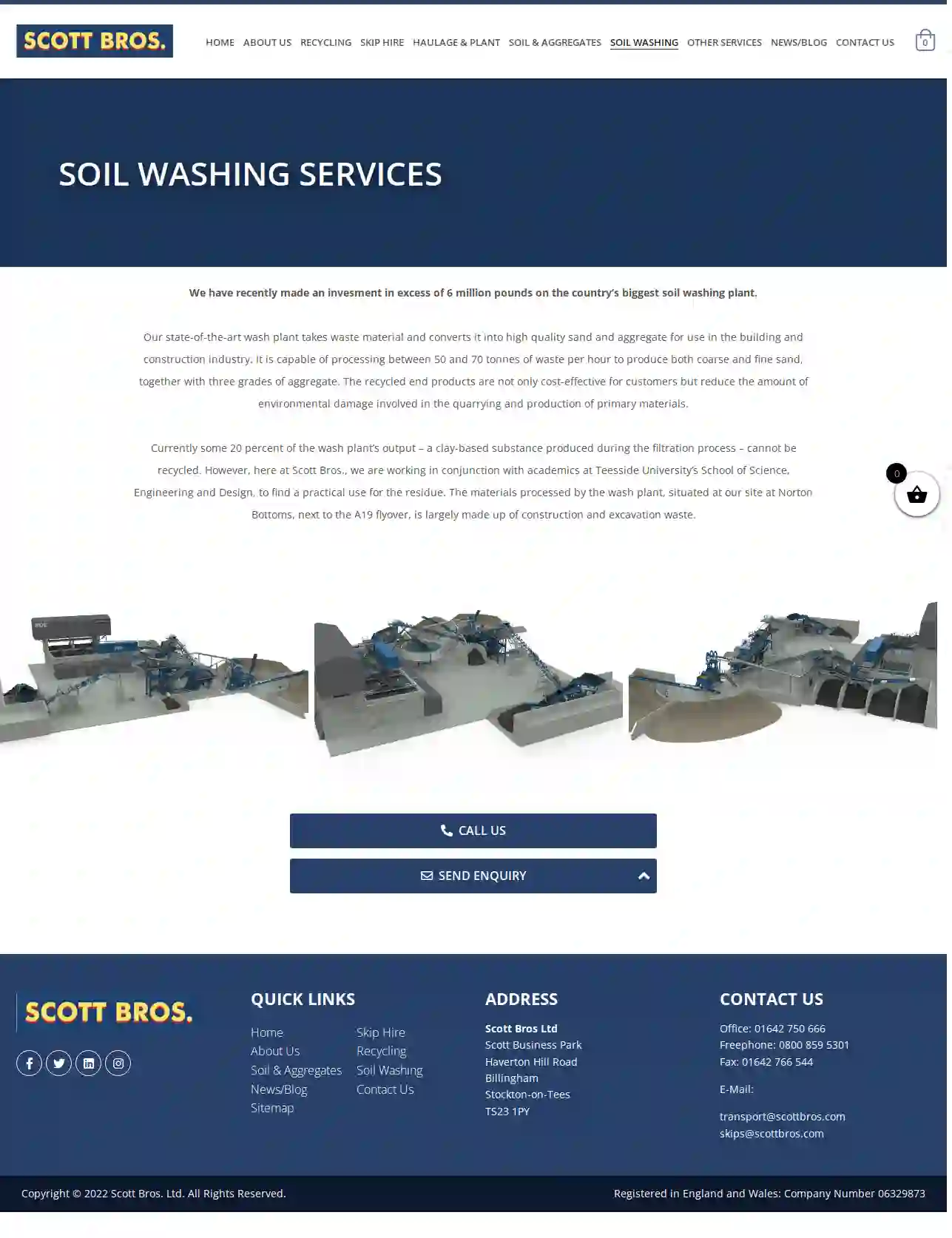
Scott bros Aggregate Wash Plant
52 reviewsHaverton Hill Road, Billingham, Haverton Hill Road Billingham Stockton-on-Tees, TS23 1PY, GBWelcome to the Scott Brothers group of companies Teesside’s experts in recycling, plant and haulage since 1971. Scott Bros. group of companies are a large haulage and plant hire, recycling and aggregate company based in the North East of England. We are a family-owned and family-grown business, having been founded by owner David Scott in Thornaby in 1972. Industry-leading, we provide state of the art machinery and top-quality aggregate, as well as intelligent recycling solutions and, of course, a professional and efficient skip hire service. Over the past 50 years we have developed a work ethic that puts our clients and customers at the heart of what we do, and we work hard to maintain that top-quality service. We strive to be a carbon-neutral, end-to-end business that works with the general public, local authorities, housing and commercial organisations to provide an array of services that work both efficiently and economically.
- Services
- Why Us?
- Testimonials
- Gallery
Get Quote
Wells CRS LTD
51 reviewsUnit 6, Mandale Park, Unit 6 Mandale Park Cannon Street Middlesbrough, Middlesbrough, TS1 5AJ, GBA family run business Wells CRS specialises in commercial refurbishments all over the UK. Boasting preferred partners such as Arriva UK Bus, London Transport, OCS Group and Knight Frank. We are a proud Teesside business that serves the North-East and the rest of the UK. Over the years Wells CRS has developed into a complete end-to-end, turnkey solution, from design, management and installation through to the decommissioning of equipment. Wells CRS prides itself in doing everything in line with the required regulations and is NICEIC approved in providing electrical and mechanical building solutions. From its Middlesbrough base, it also has licences and approval to work in specialist areas such as defence, security and other sensitive projects. Garry Wells founded the Wells brand from his own garage in 2002 and established the name before David Murphy became a partner in the business in 2019 when Wells CRS was officially formed. Garry and David oversaw a huge restructure of the business and together Wells CRS now works with a number of blue-chip clients, local councils and all different sizes of businesses after drawing on one another’s contacts. Wells CRS’ engineers are polite, courteous and professional and are always in smart, company-branded uniform with an intention to keep standards extremely high. Our workplaces are clean and tidy, before and after, every working shift. The dedicated Wells CRS management team is ‘working today for better partnerships tomorrow’. Working today for better partnerships tomorrow Garry Wells started the business from his garage but soon gained the respect of blue chip clients to the extent that the company invested in its own commercial properties and nearby warehousing. Wells CRS has been one of the most innovative suppliers of engineering resources for control technology to local transport sectors since 2002.
- Services
- Why Us?
- Gallery
Get Quote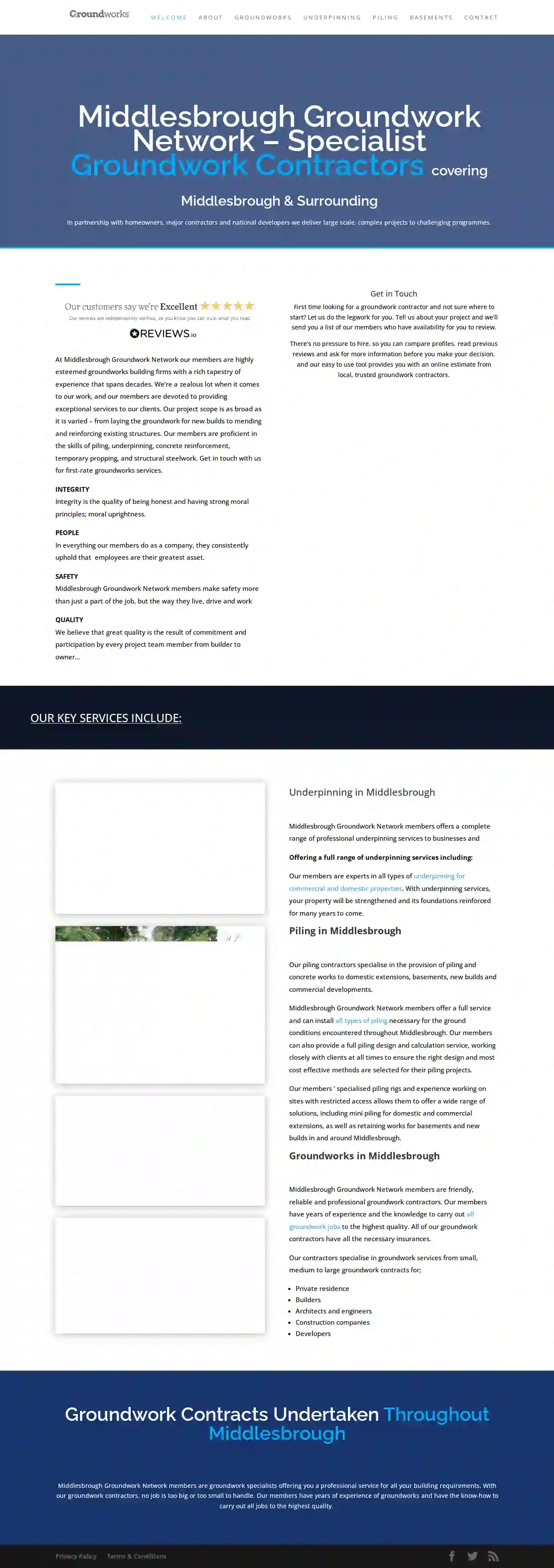
CJ Groundworks and Construction
Middlesbrough, GBMiddlesbrough Groundwork Network – Specialist Groundwork Contractors covering Middlesbrough & Surrounding In partnership with homeowners, major contractors and national developers we deliver large scale, complex projects to challenging programmes. At Middlesbrough Groundwork Network our members are highly esteemed groundworks building firms with a rich tapestry of experience that spans decades. We’re a zealous lot when it comes to our work, and our members are devoted to providing exceptional services to our clients. Our project scope is as broad as it is varied – from laying the groundwork for new builds to mending and reinforcing existing structures. Our members are proficient in the skills of piling, underpinning, concrete reinforcement, temporary propping, and structural steelwork. Get in touch with us for first-rate groundworks services. Our Values INTEGRITY Integrity is the quality of being honest and having strong moral principles; moral uprightness. PEOPLE In everything our members do as a company, they consistently uphold that employees are their greatest asset. SAFETY Middlesbrough Groundwork Network members make safety more than just a part of the job, but the way they live, drive and work QUALITY We believe that great quality is the result of commitment and participation by every project team member from builder to owner…
- Services
- Why Us?
- Gallery
Get Quote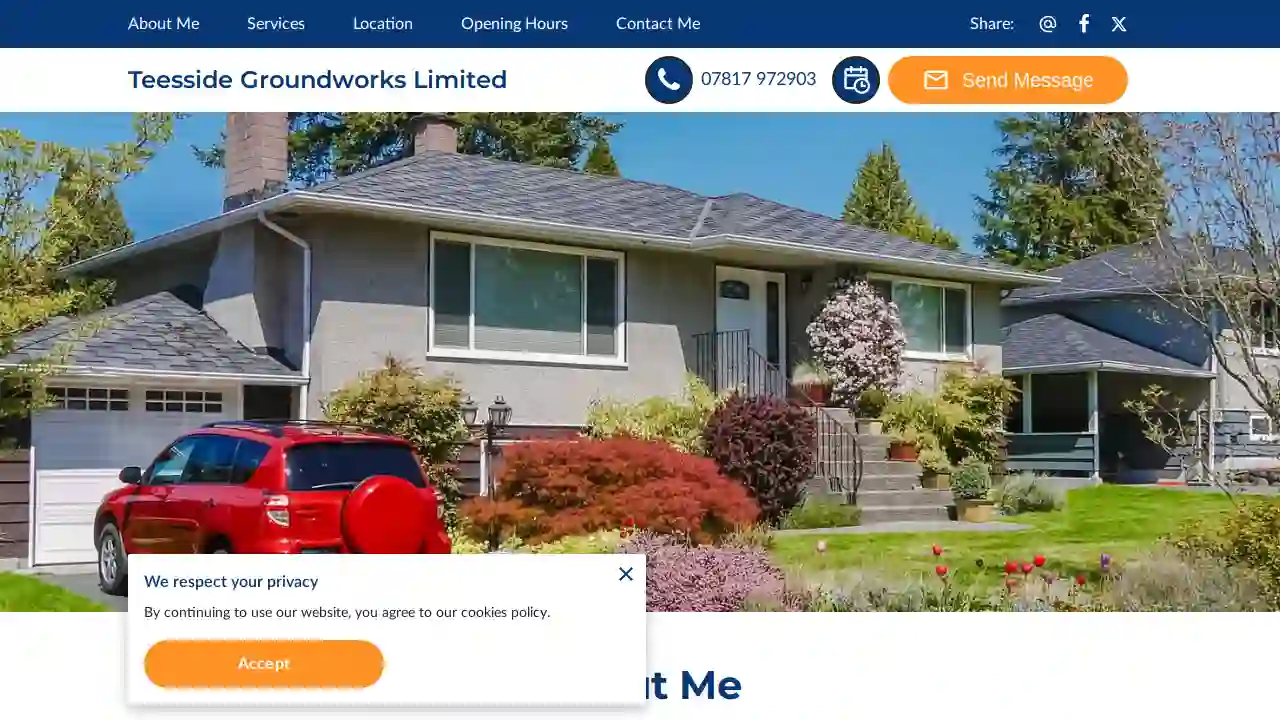
Teesside Groundworks Limited
51 reviewsChelmsford Road, Middlesbrough, TS5 6PH, GBBest Builders & Contractors in Middlesbrough At Teesside Groundworks Limited, we pride ourselves on being builders and contractors that are synonymous with high-quality, skilled craftsmanship. We provide a full range of building services in Middlesbrough, from renovation to restoration and site management. No matter how big or small your project is, our approach is always the same – focused, professional and with true attention to detail. To find out more about how we can help, contact us on 07817972903. Friendly Team We approach all our projects with the same commitment and professionalism and we’re proud of our hard-earned reputation for skilled workmanship and attention to detail. Our dedicated team are courteous, approachable and fully up to date with the latest building regulations, ensuring all projects are completed safely and to the same high standards each and every time. If you’ve got a project that needs some attention, then contact us to see how we can help. Expert Services Offering a complete range of services, we deliver projects on time and to budget. Our skills also mean we can create bespoke carpentry and joinery solutions to meet your needs. So, whether you’re looking to extend, restore, or renovate, our team have the vision and experience to find a resolution to suit your budget and timescale. Contact us to see how we can help.
- Services
- Why Us?
Get Quote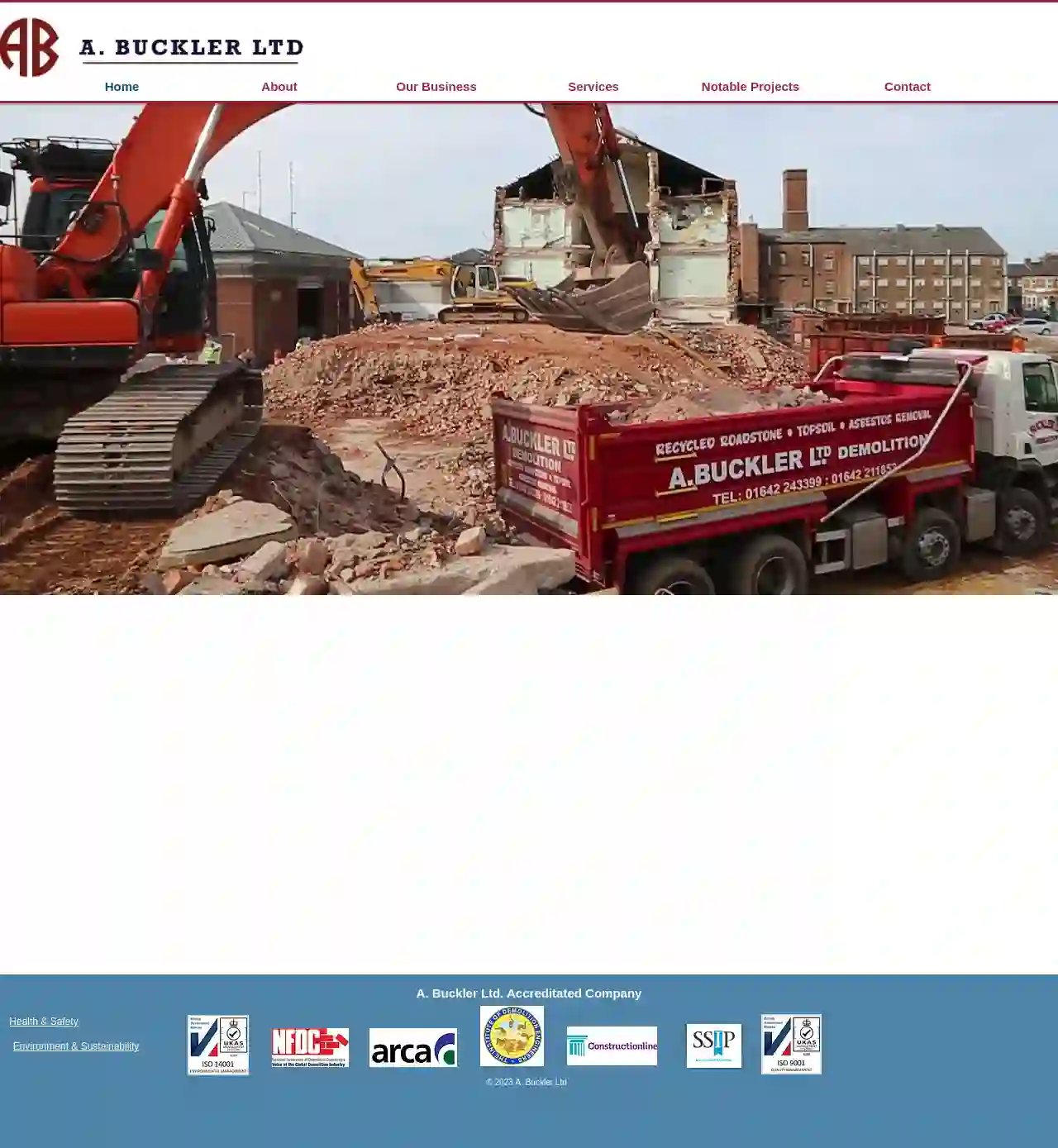
A Buckler Haulage
53 reviewsMiddlesbrough, GBA. Buckler Ltd. - Your Trusted Demolition, Asbestos, and Remediation Partner A. Buckler Ltd. is a leading provider of demolition, asbestos removal, and remediation services across the UK. We are committed to delivering high-quality, safe, and environmentally responsible solutions for our clients. Our team of experienced professionals is dedicated to exceeding expectations and ensuring that every project is completed on time and within budget. We understand that demolition, asbestos removal, and remediation projects can be complex and challenging. That's why we take a collaborative approach, working closely with our clients to develop customized solutions that meet their specific needs. We are also committed to providing clear and transparent communication throughout the entire project lifecycle. At A. Buckler Ltd., we are proud of our reputation for excellence. We are fully accredited and insured, and we are committed to adhering to the highest industry standards. We are also dedicated to protecting the environment and minimizing our impact on the surrounding community. Whether you are a homeowner, a business owner, or a developer, we can help you with your demolition, asbestos removal, and remediation needs. Contact us today to learn more about our services and how we can help you achieve your project goals.
- Services
- Why Us?
- Gallery
Get Quote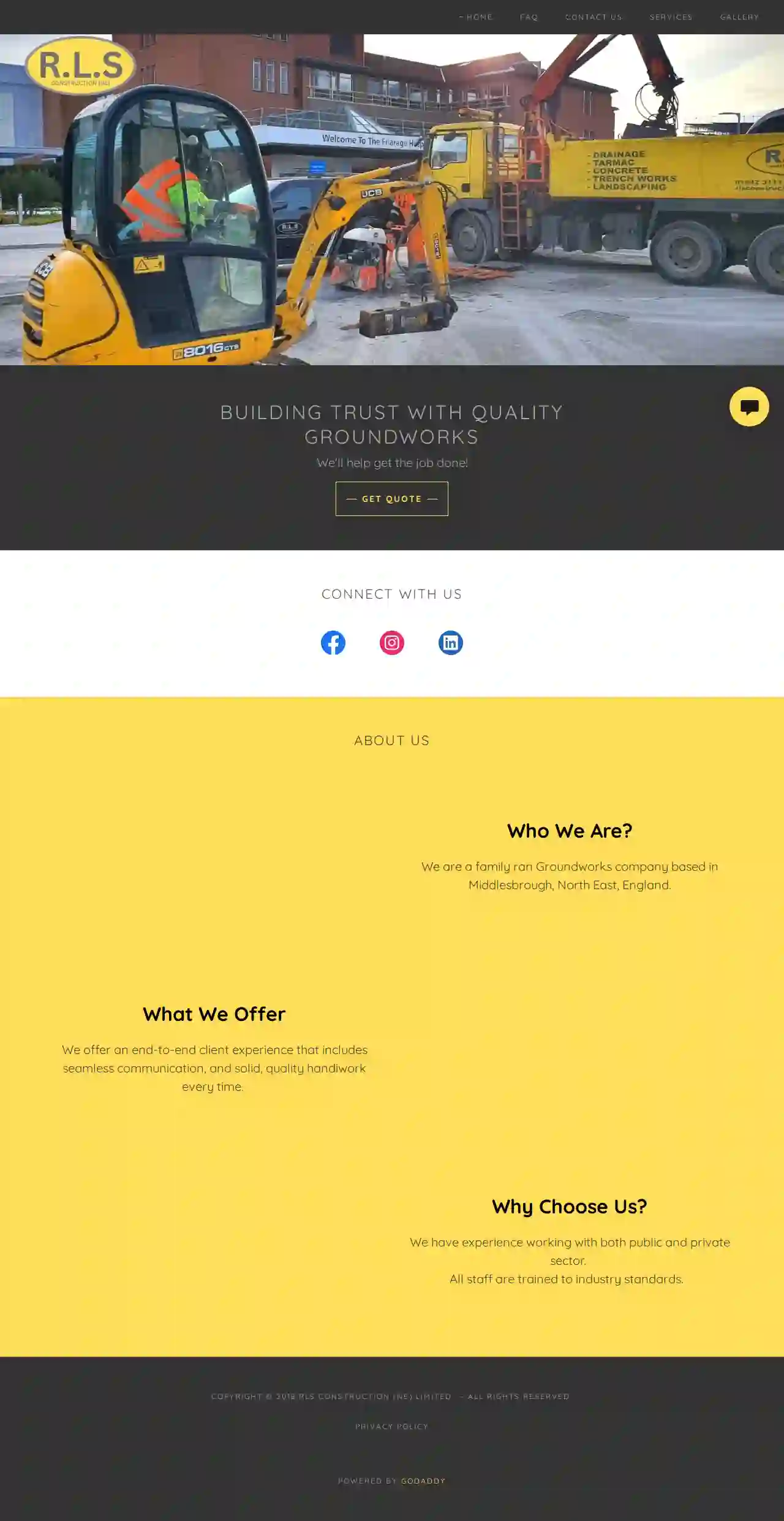
RLS Construction (Ne) Limited.
51 reviewsMiddlesbrough, GBBuilding Trust with Quality Groundworks We'll help get the job done! Get Quote Connect With Us About Us Who We Are? We are a family-run Groundworks company based in Middlesbrough, North East, England. What We Offer We offer an end-to-end client experience that includes seamless communication, and solid, quality handiwork every time. Why Choose Us? We have experience working with both public and private sectors. All staff are trained to industry standards.
- Services
- Why Us?
- Gallery
Get Quote
Geoinvestigate Ltd Site Investigations
51 reviewsMiddlesbrough, GBMore than Professional Consultancy & Technical Services Geoinvestigate’s experts minimise ground risk by careful site investigation accurate ground characterisation and conceptual modelling leading to practical cost effective, safe design solutions and successful project delivery avoiding delays, disputes, and unexpected cost overruns. Contact our team of site investigation experts and professional geo-consultants to see how we can best assist your project reduce ground risks or ask for a no obligation quote. Since the establishment of the firm in 1997 with its cleverly chosen uniquely special name, ‘Geoinvestigate’ and ‘Geoinvestigation’ are increasingly used in site investigation to describe geological, geotechnical & geoenvironmental exploration services. 25 years on and with many new talents joining and a new office opened recently, in the East Midlands, Geoinvestigate is re-energised and even cooler.
- Services
- Why Us?
- Testimonials
- Gallery
Get Quote
Over 13,059+ Excavation Contractors onboarded
Our excavation companies operate in Grangetown and surroundings!
ExcavationHQ has curated and vetted the Best Excavation Companies arround Grangetown. Find a top & reliable pro today.
Frequently Asked Questions About Excavation Contractors
- Spring and Fall: Often considered favorable due to moderate temperatures and drier soil conditions.
- Summer: Can be suitable, but hot weather can make working conditions challenging and might require additional measures (shade, hydration) for workers.
- Winter: Excavation in winter can be more difficult due to frozen ground, snow, and potential delays caused by inclement weather. It might also require specialized equipment or techniques.
- Determine the Area: Measure the length and width of the area you want to fill. Multiply them to get the area in square feet (or meters).
- Determine the Depth: Measure the difference between the existing grade and the desired grade (how much you need to raise the ground). This is the depth of fill required.
- Calculate Volume: Multiply the area (step 1) by the depth (step 2) to get the volume in cubic feet (or meters).
- Account for Compaction: Fill dirt compacts when it settles, so add 10% to 25% to the calculated volume to account for compaction. The exact percentage depends on the type of fill material.
- New Construction: Laying foundations, basements, or underground utilities for new buildings.
- Home Additions: Creating space for new rooms, basements, or extensions.
- Landscaping: Leveling ground, creating slopes, installing retaining walls, or digging for ponds or pools.
- Drainage Improvement: Installing French drains, drainage ditches, or swales to manage water runoff.
- Utility Installation or Repair: Laying new water, sewer, gas, or electrical lines, or repairing existing ones.
- Demolition: Clearing debris and preparing the site after demolishing a structure.
What is the best time of year for excavation?
What is the difference between topsoil and subsoil?
Topsoil: The uppermost layer, typically rich in organic matter, nutrients, and microorganisms. It's essential for plant growth and is often darker in color.
Subsoil: The layer beneath the topsoil, containing less organic matter and generally denser. It provides support for roots but is less fertile than topsoil.
During excavation, topsoil is often removed and preserved separately for later use in landscaping, while subsoil is typically used for backfilling or other less demanding applications.
How do I calculate how much dirt I need for fill?
How do I know if I need excavation for my project?
What is the best time of year for excavation?
- Spring and Fall: Often considered favorable due to moderate temperatures and drier soil conditions.
- Summer: Can be suitable, but hot weather can make working conditions challenging and might require additional measures (shade, hydration) for workers.
- Winter: Excavation in winter can be more difficult due to frozen ground, snow, and potential delays caused by inclement weather. It might also require specialized equipment or techniques.
What is the difference between topsoil and subsoil?
Topsoil: The uppermost layer, typically rich in organic matter, nutrients, and microorganisms. It's essential for plant growth and is often darker in color.
Subsoil: The layer beneath the topsoil, containing less organic matter and generally denser. It provides support for roots but is less fertile than topsoil.
During excavation, topsoil is often removed and preserved separately for later use in landscaping, while subsoil is typically used for backfilling or other less demanding applications.
How do I calculate how much dirt I need for fill?
- Determine the Area: Measure the length and width of the area you want to fill. Multiply them to get the area in square feet (or meters).
- Determine the Depth: Measure the difference between the existing grade and the desired grade (how much you need to raise the ground). This is the depth of fill required.
- Calculate Volume: Multiply the area (step 1) by the depth (step 2) to get the volume in cubic feet (or meters).
- Account for Compaction: Fill dirt compacts when it settles, so add 10% to 25% to the calculated volume to account for compaction. The exact percentage depends on the type of fill material.
How do I know if I need excavation for my project?
- New Construction: Laying foundations, basements, or underground utilities for new buildings.
- Home Additions: Creating space for new rooms, basements, or extensions.
- Landscaping: Leveling ground, creating slopes, installing retaining walls, or digging for ponds or pools.
- Drainage Improvement: Installing French drains, drainage ditches, or swales to manage water runoff.
- Utility Installation or Repair: Laying new water, sewer, gas, or electrical lines, or repairing existing ones.
- Demolition: Clearing debris and preparing the site after demolishing a structure.